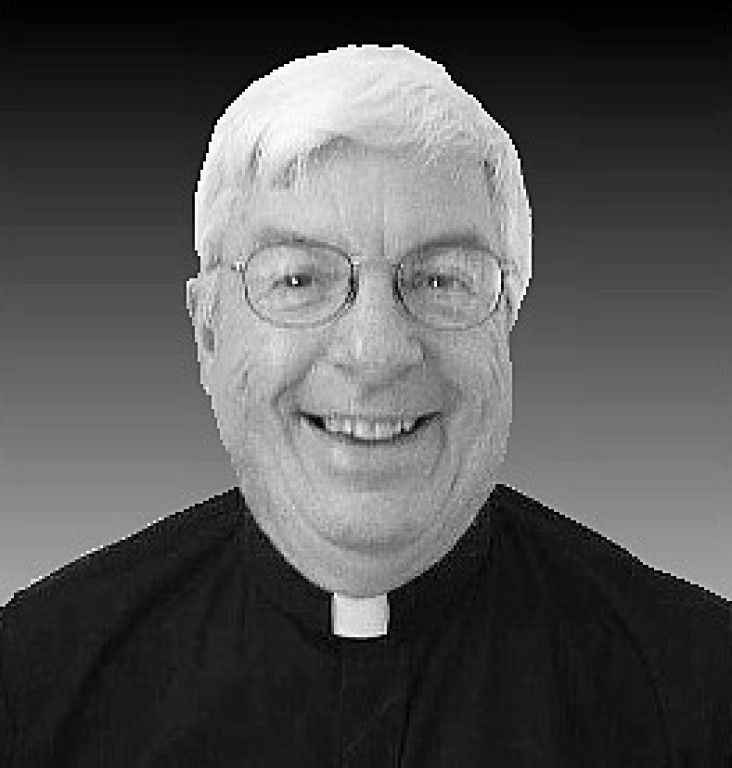 Hearing the Voice of the Shepherd
Hearing the Voice of the Shepherd
Homily for the Fourth Sunday of Easter - May 3, 2020
This Fourth Sunday of Easter is also known as Good Shepherd Sunday because Jesus is presented to us in the imagery of a shepherd. Today I want to focus our attention on the relationship between shepherd and flock, Jesus and us. In our gospel reading, John 10:1-10, our Lord says that his sheep follow him “because they recognize his voice.” Furthermore, his sheep will not follow a stranger because “they do not recognize the voice of strangers.”
It is primarily through prayer that we are given the beautiful opportunity to hear our Shepherd’s voice. But for many of us there is a problem. How can we strengthen our relationship with Jesus by hearing his voice in prayer if our mind, our world, and our heart are often pulling us in many directions because they are full of noise and distractions?
It is a lot like one of my favorite cartoons from many years ago, Dennis the Menace. In the first panel, Dennis with his dog, Ruff, at his side, is walking along with Margaret. Dennis is merrily pulling a red wagon, while Margaret, clutching her doll, is jabbering to the wind. In the second panel, Dennis gives Ruff a sidelong glance while Margaret’s prattle continues. However, she is now speaking directly in Dennis’ ear. The third scene shows Margaret wildly pelting Dennis with her doll saying, “Dennis, you’re not listening to me when I’m speaking to you.” In the final section Dennis turns to Margaret and says, “Margaret, I’m listening to you, it’s just that I’m not paying any attention.”
I find that my prayer time can be like that. Instead of giving my full attention to communicating and communing with God, I allow other issues and concerns, along with everything that is swirling around me, to take center stage. At those times, there’s little chance of hearing the Shepherd’s voice because there’s just too much noise.
Let me offer a distinction. There is a difference between saying prayers and praying at a deeper level. We can certainly use our common prayers, such as the Lord’s Prayer, or the Rosary, but, here too, it’s all too easy to rattle the prayers off without really focusing on our relationship with God. I believe we can go deeper.
There is a beautiful story about St. John Vianney, a village priest in 19 th century France who became well known for his spiritual gifts. One day Vianney was heading out to make some parish visits, and as he left the church, he noticed an elderly man praying devoutly. When he returned many hours later, he noticed the same man, still praying in the church. He asked, “What have you been doing here all day?” The man replied, “Oh, I’ve been looking at God, and God has been looking at me, and we are both very happy.”
Now, I don’t want to scare you off, or make you think that you have to spend all day praying, but this story captures the deep relationship with God that quality time spent in prayer can bring. It also makes clear that a relationship with God is not reserved for a few Saints, or those in monasteries and convents.
If we look to the Master himself, we find that the gospel accounts speak of Jesus spending significant time in prayer, before or after a long day of teaching and healing, and especially when key decisions had to be made, such as the choice of the twelve Apostles. The night before he died, Jesus brought his agony and fear to the Father in fervent prayer.
So where do we begin? In a book entitled Stillness is the Key , author Ryan Holiday stresses the importance of being in the present moment. All too often, Holiday argues, “we do not live in this moment. We, in fact, try desperately to get out of it—by thinking, doing, talking, worrying, remembering, hoping, whatever. We pay thousands of dollars to have a device in our pocket to ensure that we are never bored. We sign up for endless activities and obligations, chase money and accomplishments, all with the naïve belief that at the end of it will be happiness….The real present moment is what we choose to exist in, instead of lingering on the past or fretting about the future. It’s however long we can push away the impressions of what’s happened before and what we worry or hope might occur at some other time….Who is so talented that they can afford to bring only part of themselves to bear on a problem or opportunity? Whose relationships are so strong that they can get away with not showing up?” (pp. 26-27)
So to begin our prayer, we need to “show up” totally —give our entire attention, mind, heart and soul to this time with God. Here’s a simple way to start. Sit comfortably with your back straight, feet on the floor and hands in your lap. Close your eyes. Take some slow, deep breaths. This should begin to calm your body down. Begin to be totally present to this special time with God. When thoughts, concerns and distractions arise, simply name them (“car passing by” or “tonight’s dinner” or “tomorrow’s meeting” or “my friend’s problem”) and then set them aside. You can imagine putting them on a shelf or into a paper bag at your side. That doesn’t mean you will ignore them or forget them; you are simply setting them aside for another time. This time is to be spent with God in prayer. Hopefully, you will find that, with time, the distracting thoughts and concerns will stop, and you can be totally present to God. Some people find it helpful to use a word or phrase to help them focus, to gently call them back if they begin to wander (“Jesus” or “Jesus, I love you” or “Abba, Father”—whatever helps). Be very still, as you are in the presence of God.
Thomas Merton, the Trappist monk who did so much to bring the richness of prayer to the larger community, reminded us that beyond the words of prayer is the Mystery to which the words lead. Here is one of the homey ways he used to describe it: “The purpose of a fish trap is to catch fish. When the fish are caught, the trap is forgotten. The purpose of a rabbit snare is to catch rabbits. When the rabbits are caught, the snares are forgotten. The purpose of a word is to convey ideas. When the ideas are grasped, the words are forgotten….The purpose of prayer is to enter the presence of God. When one enters God’s presence, the words of prayer are forgotten.”
There is a beautiful passage about the Old Testament prophet Elijah and his encounter with God. It is found in the first book of Kings, chapter 19, verses 11-13:
Then the Lord said, “Go out and stand on the mountain before the Lord. Behold, the Lord is about to pass by.” And a great and mighty wind tore into the mountains and shattered the rocks before the Lord, but the Lord was not in the wind. After the wind there was an earthquake, but the Lord was not in the earthquake. After the earthquake there was a fire, but the L ord was not in the fire. And after the fire came a still, small voice. When Elijah heard it, he wrapped his face in his cloak and went out and stood at the mouth of the cave.
When our lives are full of noise and distractions, it is good to remember that we cannot hear the Shepherd’s voice in wind, or earthquake, or fire. We must make ourselves still enough, so that we can discern the “still, small voice”.
In Jesus’ approach to prayer, our Lord taught his disciples: “ But when you pray, go into your inner room, shut your door, and pray to your Father, who is unseen. And your Father, who sees what is done in secret, will reward you. And when you pray, do not babble on like pagans, for they think that by their many words they will be heard.…” (Matthew 6:6-7). By going to the inner room of our hearts, it is there, in the stillness, that we can hear the small, still voice of the Shepherd. Let me be clear about one point. I am not suggesting that in prayer you will hear God’s voice in an audible fashion (unless you are one of the chosen few). Rather, it is in our heart, our mind, our conscience that we can discern the Lord speaking to us, heart to heart.
Let me also suggest that, since Scripture is a very privileged way in which our God is revealed to us, I find that meditating on Scripture passages is a great help in trying to discern God’s presence and God’s direction for my life. Let me share an example. The responsorial psalm for this Fourth Sunday of Easter is the beloved 23 rd Psalm. Here it is in the version I first heard it as a child, in the beautiful English of the King James Version (if “thee’s” and “thou’s” turn you off, there are many other translations):
The Lord is my shepherd; I shall not want.
He maketh me to lie down in green pastures: he leadeth me beside the still waters.
He restoreth my soul: he leadeth me in the paths of righteousness for his name's sake.
Yea, though I walk through the valley of the shadow of death, I will fear no evil: for thou art with me; thy rod and thy staff they comfort me.
Thou preparest a table before me in the presence of mine enemies: thou anointest my head with oil; my cup runneth over.
Surely goodness and mercy shall follow me all the days of my life: and I will dwell in the house of the Lord for ever.
Once I have quieted my mind and heart and placed myself in the presence of God, I will then prayerfully read a Scripture passage such as this psalm. I let it wash over me, as I read it more than once. What word, what thought, what image strikes me? During this coronavirus pandemic, the words my heart settles on are these:
“Yea, though I walk through the valley of the shadow of death, I will fear no evil: for thou art with me.”
The Lord, who left the ninety-nine sheep and went in search of the one who was lost and afraid, this is the Lord who is with me, with us, with all of you whom I love and long for. And I will fear no evil, for our Shepherd is with me, with us. In the stillness I have heard his voice, a small, still voice, that brings me calm and restores my peace, and enables me to walk on, even through the valley of the shadow of death. I am safely in the loving arms of the Good Shepherd. I stay there, noticing the beautiful green pastures of spring, the reassuring sounds of the running stream. How good it is to be watched over, to be protected from evil. The risen Lord, who brings life in abundance, even life from a tomb, embraces me with goodness and mercy in this life, and the promise of eternal life in the house of the Lord forever. I am at peace and unafraid for I have heard the still, small, reassuring voice of the Shepherd.
Glory be to the Father, and to the Son, and to the Holy Spirit, as it was in the beginning, is now, and ever shall be, world without end. Amen.
You might also like
Father's Homilies




